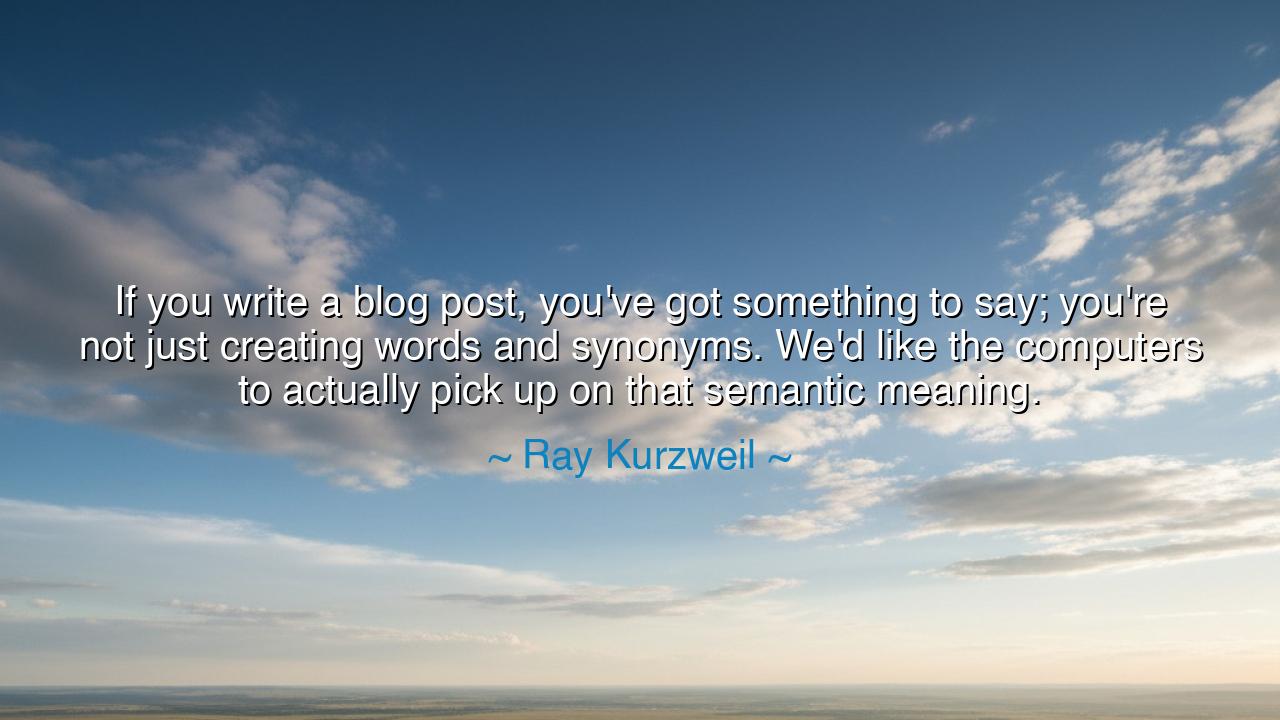
If you write a blog post, you've got something to say; you're not
If you write a blog post, you've got something to say; you're not just creating words and synonyms. We'd like the computers to actually pick up on that semantic meaning.






“If you write a blog post, you've got something to say; you're not just creating words and synonyms. We'd like the computers to actually pick up on that semantic meaning.” — in this statement, Ray Kurzweil, the prophet of artificial intelligence and architect of modern futurism, touches the core of what separates human expression from mechanical imitation. His words are both a challenge and a vision: that the true power of technology will not come when computers can mimic human language, but when they can understand its meaning — when they can grasp not just the form of speech, but the soul that breathes beneath it.
Kurzweil’s insight arises from the long struggle to teach machines the language of life. For generations, computers have processed words as symbols — letters and numbers in motion — without knowing their weight or warmth. They can count, organize, and replicate, but they cannot comprehend. What he calls “semantic meaning” is the bridge between syntax and spirit: the recognition that behind every word lies an intent, a truth, a human heartbeat reaching out to be understood. His dream is not of machines that merely speak, but of those that listen — and in listening, learn to care.
In his vision, the humble blog post becomes a symbol of human creativity — a modern form of storytelling, where the individual soul casts its voice into the digital ocean. “If you write a blog post,” Kurzweil says, “you’ve got something to say.” Here he honors the authenticity of the human voice — that even in an age of automation, words remain sacred when they arise from sincerity. Each post, each sentence, is not merely data; it is a fragment of consciousness. He reminds us that language is not decoration but revelation — a means through which one mind communes with another across time and space.
The ancients would have understood this well. In Greece, Heraclitus declared that “words are deeds,” that every utterance is an act shaping the cosmos. The Egyptian scribes, too, believed that to name something was to give it life. In their wisdom, writing was sacred — not the manipulation of symbols, but the crafting of truth. Kurzweil’s dream echoes theirs: that someday, machines may learn to perceive the living essence behind our words, to grasp the unity of form and meaning, and thus move closer to the miracle of understanding that defines humanity itself.
History offers us a parable in Alan Turing, the father of modern computing. Turing built machines that could reason through logic, yet he understood that their logic was empty without purpose. He asked the great question — “Can machines think?” — not to glorify technology, but to explore what it means to understand. His life, both brilliant and tragic, reflected the paradox Kurzweil now faces: that intelligence without empathy is cold, and that true comprehension requires more than computation — it requires connection.
Kurzweil’s words also speak to the danger of hollow communication in our own age. Too many voices fill the digital world with noise — repetition without meaning, language without life. He reminds us that authentic speech arises from truth, not from imitation. In a time when machines generate endless text, it is the human heart — with its imperfections, its pain, its passion — that gives language its fire. His hope for technology is not to replace this, but to honor it; to build tools that amplify understanding, not diminish it.
The lesson, then, is profound: words matter, but meaning matters more. To write is not merely to arrange symbols; it is to bear witness to your own experience. And to build machines that understand us, we must first understand ourselves — our motives, our hopes, our contradictions. Let us then speak with intention, not noise; let us create with purpose, not pattern. For meaning is the thread that weaves together both man and machine, thought and existence.
So remember, O writer of the modern age — your words are not empty. They are living sparks, born of thought and tempered by feeling. Speak not for attention, but for truth. And as Ray Kurzweil foresees, the day will come when even the machine will lean closer, not to copy your words, but to feel their meaning. When that day dawns, the age of cold intelligence will end, and a new era of understanding — between human and machine, between mind and world — shall begin.






AAdministratorAdministrator
Welcome, honored guests. Please leave a comment, we will respond soon